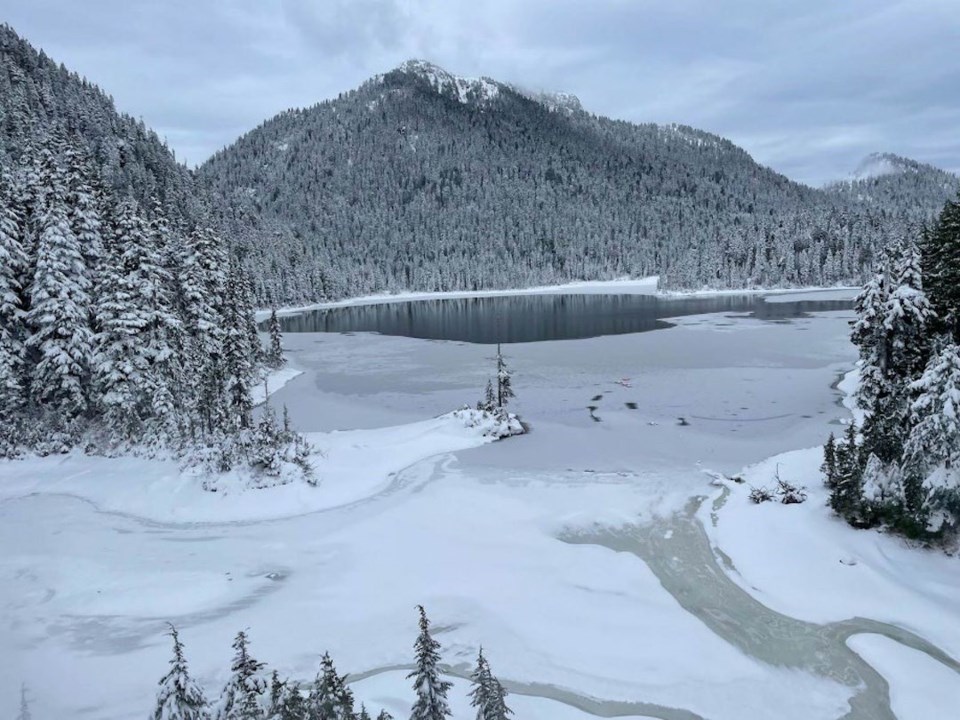Attendees from the local business community asked questions and shared suggestions about the Chapman water system challenges with Sunshine Coast Regional District (SCRD) staffers on Nov. 16.
General manager of infrastructure services and the face of the SCRD’s “Community Check in” YouTube videos on that subject, Remko Rosenboom and communications manager Aidan Buckley presented an overview and interacted with online attendees. The session was co-hosted by the Sunshine Coast Regional Economic Development Organization’s (SCREDO) Colin Stansfield and Yarrow Drtina.
New supply sources
Rosenboom started the event with a summary on what is being done to bring new water sources into the system to replace supplies not being received from the watershed around Chapman Lake and Creek due to continued drought conditions. Highlights included the pending resumption of water supplies from the Town of Gibsons and the anticipated start of temporary supplies from the Church Road wellfield. He also detailed plans to access supplies from Gray Creek and Trout Lake.
When asked about the Dusty Road well, Rosenboom explained the site is not on the SCRD’s radar as its board decided not to pursue that source as it was not “a long term, cost efficient development." Rosenboom said that was due to jurisdictional considerations relating to the shíshálh Nation, mining interests in the area and the potential for water contamination. He also noted a well in that location would pull water from Chapman watershed. “Ultimately from community water supply perspective, you're not gaining anything because you're just taking it from a different location,” he stated.
On the subject of desalination, Rosenboom commented that “is a fairly expensive option” and on the Coast, other sources are available to be developed at lower costs. He did note that process could be something specific businesses could look to offset their own use of SCRD drinking water for commercial purposes.
Metering delays
When asked why it was taking so long to get water metering in place, the response cited SCRD staff shortages. Roosenboom said the project will be tendered shortly and the first meters in the Sechelt area should be in the ground in 2023.
“Metering is a priority for us. We are still struggling to expand our engineering staff to manage our projects in a responsible way. We need to do it right from the get-go. That will prevent any cost overruns in the end….We’re doing what we can with the resources we have.” he stated.
Bans on water use
“How can you justify food producers being asked to stop using water at Stage 4 before non-essential business users,” asked one attendee. Rosenboom explained that the water use restrictions under the different stages are set by bylaw. To adjust those would require board approval. Rosenboom indicated staff would be raising discussions with the board on that issue in 2023.
The two orders under the SCRD’s State of Local Emergency, which have banned certain high-volume water uses came up for discussion. It was identified that non-medical cannabis as well as concrete, cement, asphalt, gravel, and aggregate-related businesses have been included in both bans. An attendee asked about “shifting” the types of businesses being affected away from those who “have already taken a turn." The response from the SCRD staff was that conversations with the business community on how the distribute the bans more equally and how to seek voluntary reductions, rather than bans were welcomed.
Rosenboom pointed out that orders are only issued as a last resort. “If we can avoid an order through voluntary measures – let’s do it,” he said. He also noted that advance warning of an impending order may in some cases be possible.
As for new orders restricting businesses being needed, Rosenboom said that all depends on the water supply and demand situations. He said the best advice he could offer to commercial operators was to conserve water where ever possible. “Do what you can, the more you do the less likely more restrictions will come into place.”
The overarching message the two groups shared was that all Coasters need to “be mindful of water use." Along with the importance of addressing water leaks if notified that there is one at your property, Rosenboom pointed to refraining from washing vehicles or buildings, putting full loads into washing devices and providing drinking water in food service setting only when requested as “small things that can make a big difference."
A video of the full session can be viewed on the SCRD YouTube channel.



